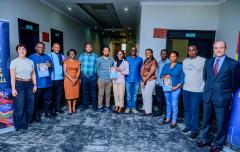New RISE report scores sustainable energy policies
A new report that analyses sustainable energy policies in over 100 countries was released today (Wednesday, 15 February) by the World Bank, as part of a contribution to Sustainable Energy for All.
The report, entitled RISE (Regulatory Indicators for Sustainable Energy), shows that an increasing number of developing countries – including Mexico, China, Turkey, India, Vietnam, Brazil, and South Africa – are emerging as leaders in sustainable energy, with robust policies to support energy access, renewables and energy efficiency.
But there is still a lot of work to do across every region in the world if we’re to achieve Sustainable Development Goal number 7 - access to clean, affordable energy - by 2030.
Rachel Kyte, CEO and Special Representative to the UN Secretary-General on Sustainable Energy for All, said: “The world is in a race to secure a clean energy transition - one that will deliver energy services for everyone, create jobs, ensure health care and education, and allow economies to grow. Increased use of renewable energy is a key element in that transition.
“RISE offers policymakers and investors the most detailed country-level insight yet into how we can level the playing field for renewable energy worldwide. Smart policy can be an accelerant of this transition. From reading RISE, countries can see where they should focus to continually improve and reap the rewards of increased investment, greater access and cleaner air.”
RISE is the first global policy scorecard of its kind, grading 111 countries in a traffic light style system across three areas: energy access, energy efficiency and renewable energy. The report is aimed at helping governments assess if they have a policy and regulatory framework in place to drive progress on sustainable energy and pinpoints where more can be done to attract private investments.
Riccardo Puliti, Senior Director and Head of Energy and Extractives at the World Bank, said: “RISE will be an invaluable tool for policymakers, helping them to identify and bolster policies and regulations that spur the kind of investments needed to extend access to modern, affordable and reliable energy for all.”
The report highlights that, in many countries, policymakers are not paying nearly as much attention to energy efficiency as to renewable energy, particularly in the developing world. Energy efficiency measures are usually the most cost-effective way of greening the energy sector.
RISE also finds that measures to promote renewable energy – such as targets, incentives and institutions – are widespread. The challenge is no longer how to build renewable power plants, but how to ensure that growing renewable capacity can be fully integrated into the power system and used to generate electricity.
Even with all of this momentum, there is still a lack of progress towards energy access in certain regions. The report illustrates the critical need for governments – in particular those in populous countries and those with particularly low electrification rates – to quickly put closing the access gap at the heart of their energy policy.
The data is freely available on an online platform that enables users to customize the information they need on each country’s power sector and policy framework. The report has 27 indicators and 80 sub-indicators and examines over 3,000 laws, regulations and policy documents
While RISE serves as a global energy policy scorecard, an upcoming, complementary World Bank report – Global Tracking Framework – will track how countries are performing on sustainable energy goals. The Framework will be released at the Sustainable Energy for All Forum from April 3-5, 2017.
Watch a video on demand stream of the launch, at this link: live.worldbank.org/rising-to-the-global-energy-challenge



